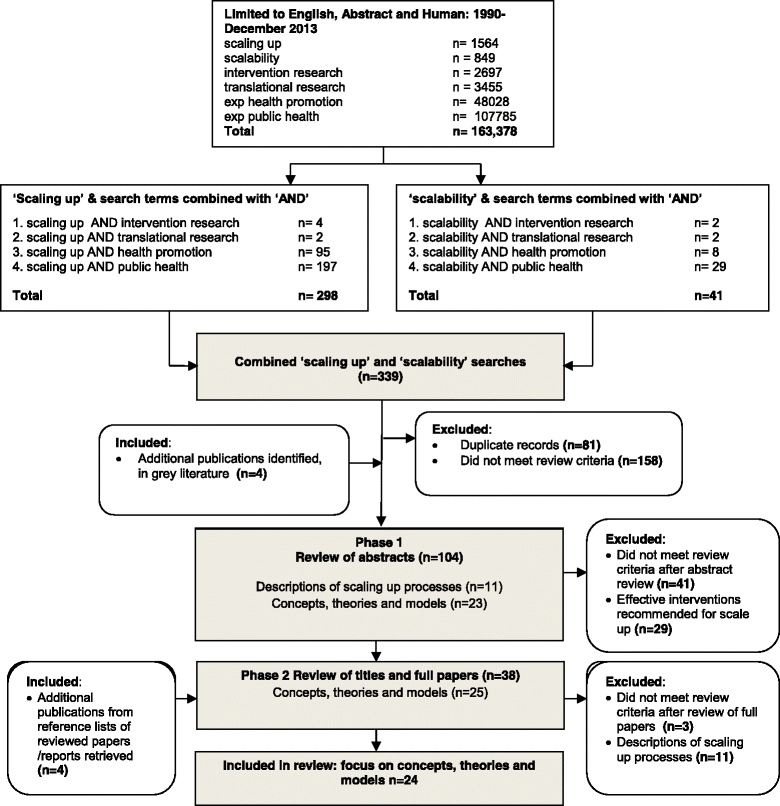Narrative review of models and success factors for scaling up public health interventions
- PMID: 26264351
- PMCID: PMC4533941
- DOI: 10.1186/s13012-015-0301-6
Narrative review of models and success factors for scaling up public health interventions
Abstract
Background: To maximise the impact of public health research, research interventions found to be effective in improving health need to be scaled up and delivered on a population-wide basis. Theoretical frameworks and approaches are useful for describing and understanding how effective interventions are scaled up from small trials into broader policy and practice and can be used as a tool to facilitate effective scale-up. The purpose of this literature review was to synthesise evidence on scaling up public health interventions into population-wide policy and practice, with a focus on the defining and describing frameworks, processes and methods of scaling up public health initiatives.
Methods: The review involved keyword searches of electronic databases including MEDLINE, CINAHL, PsycINFO, EBM Reviews and Google Scholar between August and December 2013. Keywords included 'scaling up' and 'scalability', while the search terms 'intervention research', 'translational research', 'research dissemination', 'health promotion' and 'public health' were used to focus the search on public health approaches. Studies included in the review were published in English from January 1990 to December 2013 and described processes, theories or frameworks associated with scaling up public health and health promotion interventions.
Results: There is a growing body of literature describing frameworks for scaling health interventions, with the review identifying eight frameworks, the majority of which have an explicit focus on scaling up health action in low and middle income country contexts. Key success factors for scaling up included the importance of establishing monitoring and evaluation systems, costing and economic modelling of intervention approaches, active engagement of a range of implementers and the target community, tailoring the scaled-up approach to the local context, the use of participatory approaches, the systematic use of evidence, infrastructure to support implementation, strong leadership and champions, political will, well defined scale-up strategy and strong advocacy.
Conclusions: Effective scaling up requires the systematic use of evidence, and it is essential that data from implementation monitoring is linked to decision making throughout the scaling up process. Conceptual frameworks can assist both policy makers and researchers to determine the type of research that is most useful at different stages of scaling up processes.
Figures
Similar articles
-
The concept of scalability: increasing the scale and potential adoption of health promotion interventions into policy and practice.Health Promot Int. 2013 Sep;28(3):285-98. doi: 10.1093/heapro/dar097. Epub 2012 Jan 12. Health Promot Int. 2013. PMID: 22241853
-
A framework for scaling up health interventions: lessons from large-scale improvement initiatives in Africa.Implement Sci. 2016 Jan 29;11:12. doi: 10.1186/s13012-016-0374-x. Implement Sci. 2016. PMID: 26821910 Free PMC article. Review.
-
Harmonizing scientific rigor with political urgency: policy learnings for identifying accelerators for scale-up from the safe childbirth checklist programme in Rajasthan, India.BMC Health Serv Res. 2019 May 2;19(1):273. doi: 10.1186/s12913-019-4093-2. BMC Health Serv Res. 2019. PMID: 31046754 Free PMC article. Review.
-
A narrative review of research impact assessment models and methods.Health Res Policy Syst. 2015 Mar 18;13:18. doi: 10.1186/s12961-015-0003-1. Health Res Policy Syst. 2015. PMID: 25884944 Free PMC article. Review.
-
Theories, models and frameworks used in capacity building interventions relevant to public health: a systematic review.BMC Public Health. 2017 Nov 28;17(1):914. doi: 10.1186/s12889-017-4919-y. BMC Public Health. 2017. PMID: 29183296 Free PMC article. Review.
Cited by
-
From pilot to national roll-out of the improved Community Health Fund (iCHF) in Tanzania: lessons learnt and way forward.Cost Eff Resour Alloc. 2024 Nov 12;22(1):80. doi: 10.1186/s12962-024-00571-y. Cost Eff Resour Alloc. 2024. PMID: 39533367 Free PMC article.
-
Using normalisation process theory (NPT) to explore implementation of the maternal perinatal death surveillance and response (MPDSR) policy in Uganda: a reflection.Health Res Policy Syst. 2024 Nov 4;22(1):148. doi: 10.1186/s12961-024-01191-x. Health Res Policy Syst. 2024. PMID: 39497093 Free PMC article.
-
Aligning extracurricular school activities with physical literacy: pilot evaluation through self-study of practice.Front Sports Act Living. 2024 Aug 26;6:1415689. doi: 10.3389/fspor.2024.1415689. eCollection 2024. Front Sports Act Living. 2024. PMID: 39253624 Free PMC article.
-
The Impact of Childhood Adversity on Life Course Alcohol Use Patterns and Health Status Among People Living with HIV.AIDS Behav. 2024 Sep;28(9):2887-2898. doi: 10.1007/s10461-024-04368-1. Epub 2024 Jun 22. AIDS Behav. 2024. PMID: 38907764 Free PMC article.
-
Unraveling agricultural water pollution despite an ecological policy in the Ayeyarwady Basin.BMC Public Health. 2024 Jun 10;24(1):1562. doi: 10.1186/s12889-024-19084-7. BMC Public Health. 2024. PMID: 38858688 Free PMC article.
References
-
- Productivity Commission . Strengthening evidence-based policy in the Australian Federation, volume 2: background paper. Canberra (AUST): Productivity Commission; 2010.
-
- World Health Organisation. Bridging the “know–do” gap meeting on knowledge translation in global health. http://www.who.int/kms/WHO_EIP_KMS_2006_2.pdf Accessed July 2015.
-
- McKeon R. Strategic review of health and medical research in Australia—better health through research. Canberra: Commonwealth of Australia; 2013.
Publication types
MeSH terms
LinkOut - more resources
Full Text Sources
Other Literature Sources


